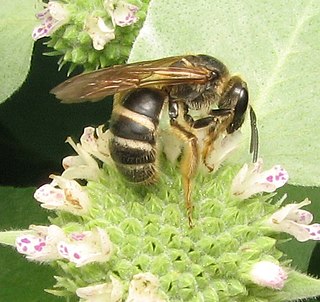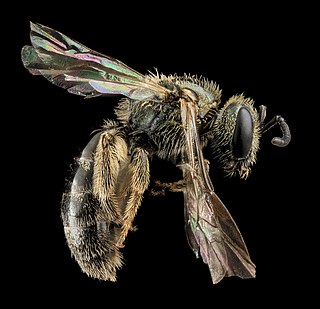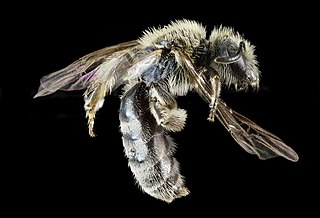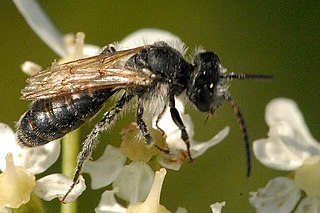
Halictidae is the second-largest family of Anthophila bees. Halictid species occur all over the world and are usually dark-colored and often metallic in appearance. Several species are all or partly green and a few are red; a number of them have yellow markings, especially the males, which commonly have yellow faces, a pattern widespread among the various families of bees. The family is distinguished by the arcuate basal vein found on the wing.

The sweat bee genus Lasioglossum is the largest of all bee genera, containing over 1700 species in numerous subgenera worldwide. They are highly variable in size, coloration, and sculpture; among the more unusual variants, some are cleptoparasites, some are nocturnal, and some are oligolectic. Most Lasioglossum species nest in the ground, but some nest in rotten logs.

Lasioglossum zephyrus is a sweat bee of the family Halictidae, found in the U.S. and Canada. It appears in the literature primarily under the misspelling "zephyrum". It is considered a primitively eusocial bee, although it may be facultatively solitary. The species nests in burrows in the soil.

Lasioglossum gotham, commonly known as the Gotham bee, is an extant species of sweat bee native to Eastern and Midwestern United States.

Lasioglossum halictoides, also known as the Lasioglossum (Nesohalictus) halictoides, is a species of bee in the genus Lasioglossum, of the family Halictidae.
Lasioglossum bidentatum, also known as the Lasioglossum (Sudila) bidentatum, is a species of bee in the genus Lasioglossum, of the family Halictidae. The species is mispellingly known as specific name bidendatum in some books.

Sargocentron punctatissimum is a species of fish related to the squirrelfish.

Lasioglossum vierecki, also known as Dialictus vierecki and Halictus vierecki, is a sand sweat bee and is part of the family Halictidae of the order Hymenoptera. It is found in the eastern half of North America from Minnesota to the New England States down to Georgia and Louisiana and up in Manitoba and Ontario. Commonly found in sandy areas, it pollinates various flowers such as grass-leaved goldenrod and rattlesnake master.

Lasioglossum leucozonium, also known as Lasioglossum similis, is a widespread solitary sweat bee found in North America, Europe, Asia, and parts of northern Africa. While now a common bee in North America, population genetic analysis has shown that it is actually an introduced species in this region. This population was most likely founded by a single female bee.

Dialictus is a subgenus of sweat bees belonging to the genus Lasioglossum. Most of the members of this subgenus have a metallic appearance, while some are non-metallic. There are over 630 species worldwide. They are commonly found in the Northern Hemisphere and are found in abundance in North America. Members of this subgenus also have very diverse forms of social structure making them model organisms for studying the social behavior of bees.

Lasioglossum pavonotum is a species of sweat bee in the family Halictidae.

Lasioglossum sisymbrii is a species of sweat bee in the family Halictidae.

Lasioglossum zonulum is a species of sweat bee in the family Halictidae. It is found in Europe.

Lasioglossum bruneri, or Bruner's dialictus, is a species of sweat bee in the family Halictidae.

Homalictus is a subgenus of bees in the genus Lasioglossum subfamily Halictinae of the family Halictidae. They are found in Sri Lanka, Southeast Asia, east across the Pacific to the Mariana Islands, Samoa, Fiji and are most prevalent in Australia.
Lasioglossum imitatum is a species of sweat bee in the family Halictidae. It is known as the bristle sweat bee.














